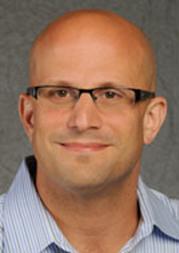
Name: Evan Nadler, MD
Title: Associate Professor of Surgery, Pediatrics, and Integrative Systems Biology
Institution: Children's National Medical Center
Clinical Specialty: Pediatric Bariatric Surgery
Research Interest: Liver fibrosis
Webpage: http://www.childrensnational.org/FindADoctor/DoctorProfile.aspx?DoctorID=3439&Name=Evan%20Nadler
Institution during SIS Fellowship: Children's Hospital of Pittsburgh
SIS Fellowship Mentor: Henri Ford, MD
SIS Fellowshp Project Title: Mechanisms of Nitric Oxide-mediated Enterocyte Apoptosis
Fellowship Publication:
- Nadler EP, Dickinson EC, Knisely A, Zhang XR, Boyle P, Stolz D, Watkins SC, Ford HR. Expression of Nitric Oxide And Interleukin-12 in Experimental NEC. J Surg Res, 92: 71-77, 2000.
How did you hear about the SIS Fellowship? From my mentor, Henri Ford, who encouraged me to seek out society funding opportunities.
Who was the main influence on your choice to become an academic surgeon? Henri Ford – he was the consummate surgeon who was skilled in the OR and successful in the lab. His command of both the operative and research topics was impressive, and I wanted to emulate him in every way I could.
How did you get involved in surgical infections research? It was the topic of my mentor’s research. The position was funded, and I needed to secure funding from outside or else my residency program would not let me leave for two years. Honestly, whatever his main research project was at the time would have been my area of investigation and it just happened to be surgical infection research.
Can you describe how the fellowship helped your career? Started to learn the process of how to plan experiments critically and the basics of grant writing.
Did you obtain further research funding in this area? Yes, seed money grant at my institution prior to changing my research directions.
Can you elaborate how your research focus has changed? How did you make the transition from what you did then to what you do now? My research focus has changed for a multitude of reasons, but mostly it was a calculated decision I made when I was leaving my fellowship at Children’s Hospital of Pittsburgh. I wanted to be able to separate my accomplishments from those of my mentor and his other trainees, and I thought the best way to do so was to pursue a completely different area of investigation. I chose liver fibrosis in biliary atresia because it was an area with little ongoing basic science research and one where I knew I could make an immediate impact. I now have a K08 award in this area, and will be applying for R01 funding in about two years.
What would you tell medical students who are interested in surgery? I tell them that involvement in societies is a great way to meet leaders in the field and get exposed to cutting edge clinical and basic science. The SIS is unique in that it has a real foundation in basic, translational, and clinical science. There is a niche for any researcher or person with research interest in the SIS.
What suggestions would you give to residents who would like to pursue research projects? Funding? Find a mentor. Its all about mentorship, including funding. I tell residents and students to try to find a role model for what you would like to end up like in 10-20 years. You don’t have to love their research interest, or clinical focus, but if they are the type of person you want to be, introduce yourself and try to get involved in what he/she does on a day to day basis.
Do you remember your first SIS Meeting? Who you met? My first meeting I believe was in 1998 when I received the fellowship award. I knew Phil Barie and Steve Lowry from my residency at Cornell, and the two of them and Henri introduced me to every president (past and future). It was pretty awe-inspiring.